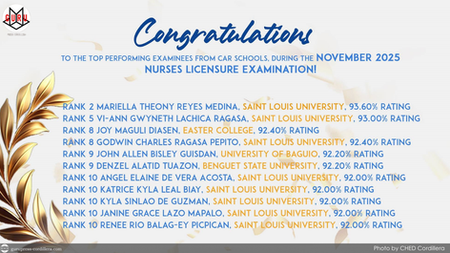Balbalan kicks off Yuletide Season with lighting of Christmas Village, bringing nostalgic joy and children’s laughter
Balbalan, Kalinga – The Yuletide season has officially begun in the Municipality of Balbalan with the lighting of its Christmas Village on December 1. Families and friends can now enjoy the colorful spectacle and lights at the Municipal Ground from 6:00 to 9:00 p.m. throughout December 2025. The Christmas Village was opened during Padalang 2025, the annual Christmas lighting ceremony that the Municipal Local Government Unit has been hosting since 2022. Town folk and visitors

Balbalan LGU
16 minutes ago1 min read
Santa Marcela receives 10 awards during the 2025 EKB Health Awards
Santa Marcela, Apayao – The Municipal Local Government Unit of Santa Marcela, under the leadership of Mayor Evelyn Martinez, together with the town’s barangays, received 10 awards from the Apayao Provincial Health Office during the EKB Health Awards 2025 held at the Apayao State College (ASC) Luna Campus on November 26. These recognitions were earned through the effective work and collaboration of the municipality and its barangays with various health partners and providers.

Arjay Baysa
17 minutes ago2 min read
‘There are 7 remaining active rebels in Kalinga… konti na lang’ – 103rd Infantry Battalion’s Lt. Loreen Derama
Tabuk City, Kalinga – Lieutenant Loreen Derama of the 103rd Infantry Battalion reported that only seven active rebels remain in Kalinga, all of whom come from different municipalities in the province. Providing an update on the peace and order situation during the Kapehan meeting held at the New Kalinga Capitol Conference Hall on Monday, December 1, Derama said that before the series of encounters between government troops and rebels in Pinukpuk from November 21–27, 2025, the

Mark Moises Calayan
9 hours ago2 min read
‘Itataya ko po ang serbisyo ko kung may mangyari sa kanila…’ – BGEN Salvador assures nothing bad will happen if rebels in Kalinga surrender
Tabuk City, Kalinga – Speaking during the Kapehan meeting of the Provincial Government of Kalinga on Monday, December 1, 2025, 503rd Infantry Brigade Commander Brigadier General Rhenante Salvador renewed the Philippine Army’s call for the remaining rebels in the province to surrender peacefully. He assured them that they will not be harmed, contrary to what “fake news” circulating online seeks to instill in the minds of the public. Salvador made the statement in connection wi

Mark Moises Calayan
22 hours ago2 min read
Santa Marcela, Apayao is three-time consecutive National Awardee of DILG’s Subaybayani Awards
Santa Marcela, Apayao – The Municipality of Santa Marcela is among the DILG’s 2025 Subaybayani Awardees nationwide for its exemplary infrastructure governance and community impact, making the town a recipient of the coveted award for the third consecutive time. “This is the third time that Santa Marcela got this award… daytoy ti ebidensiya ti nasinged ken dedicado nga panagtrabaho dagiti opisyales tayo ken government workers,” said Mayor Evelyn Martinez in an interview, addin

Arjay Baysa
22 hours ago2 min read
DOST-CAR inks MOA with Kalinga LGUs to push for more sustainable farming through smarter and technology driven approaches
There is hope for increased agricultural production and improved farm management among farmers in Kalinga following the signing of a Memorandum of Agreement between DOST-CAR and its partner LGUs in the province on December 1, 2025, to advance the adoption of smarter and more effective farming methods. Kalinga is considered as the rice granary of Cordillera and the main supplier of coffee in the region, with a total of 130,783 hectares declared as agricultural lands which corr
Brent Martinez
22 hours ago3 min read


Retirees of Kalinga PLGU serving 30 years can get P100,000 cash incentives once BM Kitongan’s ordinance is approved
Tabuk City, Kalinga – Retirees of the Provincial Government of Kalinga may soon receive higher cash incentives for their years of service as the Sangguniang Panlalawigan recently approved on second reading a proposed amendment to Provincial Ordinance No. 2018-018, which seeks to increase incentives for uninterrupted and satisfactory service. Authored by Board Member Emilio T. Kitongan, the proposed measure aims to update the long-standing policy on retirement rewards by adjus

Mark Moises Calayan
2 days ago2 min read


Balbalan, Kalinga invites public to witness “PADALANG” – lighting of Christmas village – on December 1
Balbalan, Kalinga – The Balbalan Municipal Compound in Poblacion is set to shine with dazzling lights and festive cheer on December 1, 2025, as the municipality holds its Padalang or Christmas Lighting Ceremony. “Padalang” is a local Kalinga term which means to light up and in Balbalan, it is used to refer to the ceremonial lighting of Christmas decorations or a Christmas village which has become a community tradition that marks the start of the holiday festivities. Spearhead

Leonora Lo-oy
2 days ago1 min read


Cordillera produces 11 topnotchers in Nov. 2025 Nursing Board Exam
Baguio City, Philippines – Eleven graduates from universities in the Cordillera region excelled in the November 2025 Philippine Nursing Licensure Examination (PNLE), bringing pride and honor to their alma maters. These 11 are among the 40,692 passers of the PNLE held on November 4–5 across various testing centers nationwide. Their success did not end with passing the exam; they also secured spots in the Top 10 list of examinees with the highest ratings. The topnotchers fr

Leonora Lo-oy
3 days ago1 min read


Abrenian beauty finishes Miss International stint as 4th runner-up
Tabuk City, Kalinga – Abrenian beauty and Philippine bet to Miss International 2025, Myrna Esguerra, ended her journey in the prestigious pageant as 4th runner-up. The 63rd Miss International pageant crowned its new titleholder from among 80 dazzling candidates representing their respective countries on November 27 at the Yoyogi National Gymnasium in Shibuya, Tokyo, Japan. Carrying the Philippines with grace and charm, Myrna outshone many candidates and made her way to th

Leonora Lo-oy
3 days ago1 min read


Luna, Apayao is 2025 Freedom of Information National Awardee
ALABANG, Muntinlupa City — The Municipality of Luna, Apayao, under the administration of Mayor Januario S. Garde, was recently recognized as a 2025 Freedom of Information (FOI) National Awardee by the Presidential Communications Office (PCO). The recognition was conferred on November 28, 2025, at The Bellevue, Alabang, and was received by Municipal Vice Mayor Zaira Erika L. Caluya and Secretary to the Sanggunian Erven P. Wanasen, who represented the Municipal Mayor and the

Arjay Baysa
3 days ago1 min read


Rape cases in Tabuk City up by 20.83% this year; 18 arrests made - PNP-Tabuk data from Jan. to Nov. 2025
Tabuk City - While Tabuk City law enforcers and other agencies are working hard to keep peace and order and made progress in other areas, the cases relating to rape remains a challenge with an increase of 20.83% compared to the data last year. During the Consultative Meeting for Duty-Bearer Handling Special Cases (These include Child in Conflict with the Law, Children At Risk, Violence Against Women and their Children, and Child Abuse) on November 27, 2025 at the MHotel in Ap
Brent Martinez
3 days ago2 min read
“Adda pay PATO gang (agtatakaw ti pato), siga-siga gang, ken dadduma pay… tumulong koma ti parientes to look after their kids” Tabuk CSWDO on increase of CICL cases
Tabuk, Kalinga - During the Consultative Meeting for Duty-Bearers Handling Special Cases in Tabuk City, the City Welfare and Development Office, although they didn’t mention the specific number, reported that they saw an increase in cases of Child in Conflict with the Law. Conchita Busaiya, Social Welfare Officer IV of the Protective Services Division, CSWD Office- LGU Tabuk City, informed that most of the cases they attended to involving minors were related to theft and robb
Brent Martinez
4 days ago2 min read


‘I hope LTO has plans on road accidents this coming Christmas… Adda paylang ag ka-karera dita provincial road,’ – VG Odiem
Tabuk City, Kalinga – As preparations for the Christmas season begin, Acting Governor and Vice Governor Dave Odiem reminded motorcycle riders, the Land Transportation Office (LTO), and concerned agencies to take precautionary measures against road and traffic accidents, especially with the expected increase in movement and activity in the province during the holidays. Odiem made the statement during the flag-raising ceremony on November 24, 2025, at the Capitol Gym in Bulanao

Lorraine Bacullo
4 days ago2 min read


THREE Cordillera universities recorded 100% passing rate in Nov. 2025 Nurses Licensure Exam
Lamut, Ifugao - Three universities in Cordillera have achieved a rare academic feat after all their nursing graduates passed the November 2025 Nurses Licensure Examination (NLE), placing the region among the top-performing areas in the country. The Professional Regulation Commission (PRC) announced on November 26 that 40,692 out of the 45,192 examinees successfully passed the nationwide exam conducted on November 4-5. However, the exam in Cebu, Iloilo, and Tacloban was move

Mark Moises Calayan
4 days ago1 min read

.png)














































































Comments